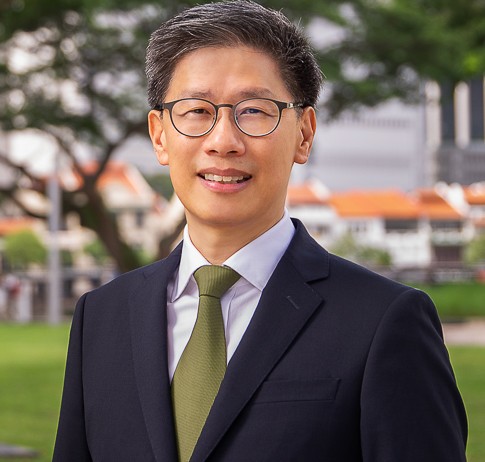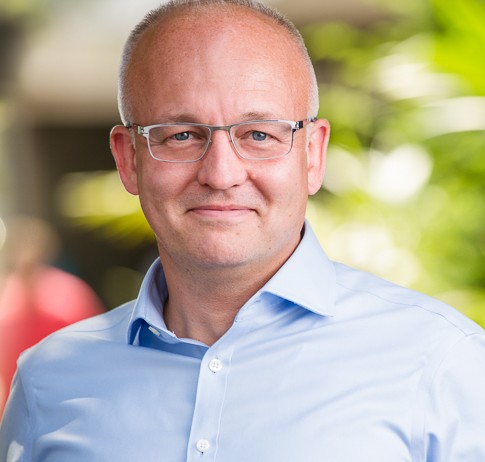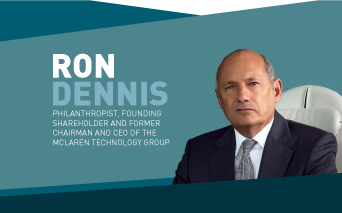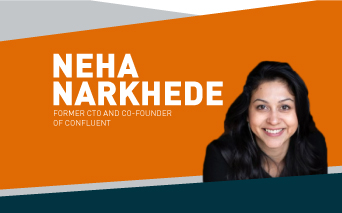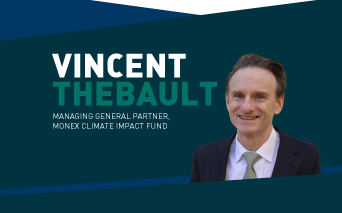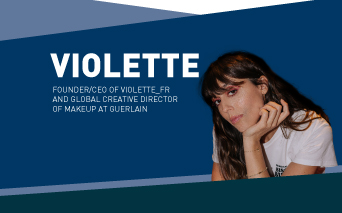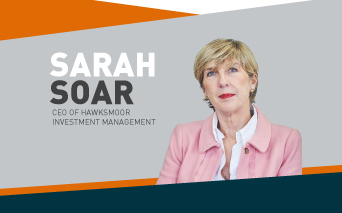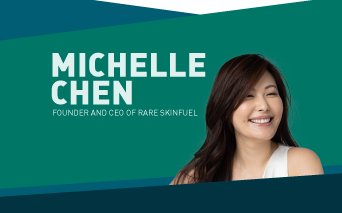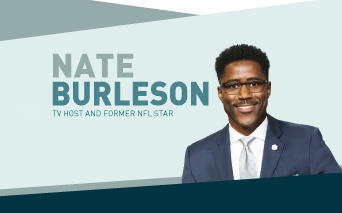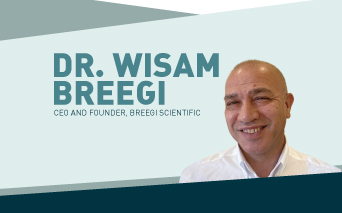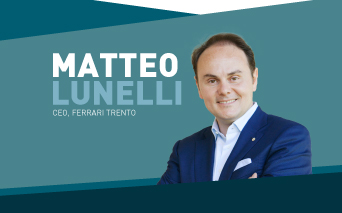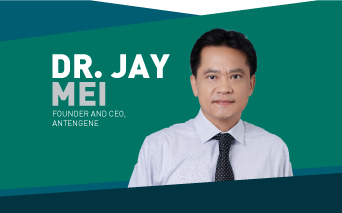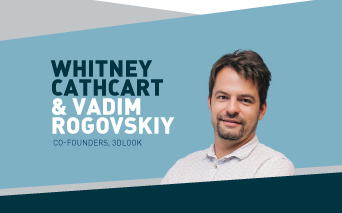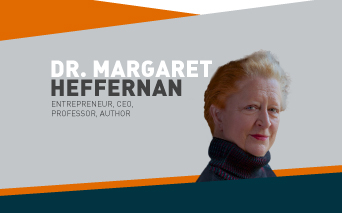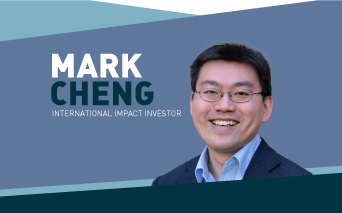Podcast
Tackling the climate crisis and changing the world
29 November 2021 | 25 minute listen
Episode 9 of Talking Success with Aasmah Mir
Aasmah talks to Rinaldo Brutoco, serial entrepreneur and founder, about the thread that links his varied career and how his passion for reversing the effects of climate change is being realised in his role as CEO and Chairman of H2 Clipper, an alternative energy company developing uniquely capable hydrogen-powered dirigibles.
Podcast host | Aasmah Mir
Aasmah Mir is an award winning broadcaster and journalist. She currently co-hosts the Breakfast Show on Times Radio and writes a regular column for The Times.
Guest | Rinaldo Brutoco
Rinaldo S. Brutoco is a successful entrepreneur, executive, author and futurist, and the Founding President of the World Business Academy. For over 25 years, he has been widely recognized as a practical visionary and change agent, specializing in energy policy, renewable energy, finance, innovation, and the causes of, and adaptation strategies for, climate change.
He is an international leader in advancing the nature of good corporate governance, corporate accountability, business transparency and ways that corporations can fulfil their social compact. In 2010, he received a Congressional Commendation for his outstanding contributions to the field of corporate responsibility.
Mr. Brutoco has spearheaded several businesses as the Principal and Chief Executive Operator of the ShangriLa Group, Inc.; Founder, Executive Chef and CEO of Seven Oaks Ranch, an organic food company, and Founder and CEO of Live Well Brands, Inc., an organic cosmetic manufacturer with distribution in over 3,500 outlets in the United States. He is also the Founder, Chairman and CEO of H2 Clipper, which has developed a revolutionary, highly-patented, hydrogen-powered dirigible which utilizes advanced aeronautical, clean energy, and materials technologies.
As part of his earlier career, Mr. Brutoco co-founded Channel 100 in 1972 and was the COO of the first company in the world to offer pay cable television services. He was also the Founder and CEO of Universal Subscription Television in 1978, one of the first companies to offer over-the-air television transmissions of major motion pictures.
Note: We have provided a transcript of the discussion in this podcast if you are unable to listen to the audio version. This transcript is generated using a combination of speech recognition software and human transcribers and may contain errors.
Aasmah Mir (00:25) I’m Aasmah Mir, and this is a series where successful people reveal the defining moments of their careers and indeed their lives, because we all face moments of crisis, it’s how we respond that makes all the difference.
Rinaldo Brutoco (00:38) We are part of a much larger harmonic and when you see it that way, as yourself it is like a little tiny being on some speck of dirt, you know, that’s a humbling thought. So, what is it that I’m here to do? And let me go after doing that and the rest takes care of itself.
Aasmah Mir (00:55) Today, I’m speaking to Rinaldo Brutoco, it’s a challenge to do him justice in a short introduction. He has founded businesses from clothing to television and a successful law centre. He’s occupied senior positions in major companies. He founded a non profit in 1987, which since has been focused on the responsibility of business to address social and environmental issues. He’s also the CEO and chairman of H2 Clipper, an aerospace development company, oh, and he’s written books about the future of energy. Rinaldo you’re a very busy man, I understand that so thank you very much for joining me.
Rinaldo Brutoco (01:32) Well thanks for having me. I appreciate it.
Aasmah Mir (01:32) I’m going to begin with one of our big questions. Is there something that people incorrectly assume about you?
Rinaldo Brutoco (01:40) If they don’t know me well, uh, yes, they, they tend to think of me as a visionary. A visionary is not someone who gets it done, someone who dreams it up. And what they don’t understand about me is I like both sides of the equation. I’m basically a mason, I love laying one brick down and putting another on top of it, so I love building companies with one brick at a time. So, I’m that unusual combination of somebody who enjoys to create at the 30,000-foot level and then I like to figure out where the last screw goes. So that’s my joy.
Aasmah Mir (02:12) Um, is it fair to assume talking about assumptions that may be incorrect, that you are someone who doesn’t get easily bored, but who does something, does it well, and then looks for the next challenge because you have transitioned quite, quite a bit, haven’t you throughout your career?
Rinaldo Brutoco (02:29) Yes. Actually, I’m so glad you asked that, congratulations. A lot of people kind of skip that question because if you look at my background, it’s so chequered, how would you make any conceivable sense out of the guy who basically co-founded, with one other guy, two other guys, the first pay television company in the world, I did that in 1972. And then I went on to broadcast television, motion, pictures, all kinds of other stuff. And then I went on to organic food and etc, the clothing and the, it goes, it keeps going on. And, and what I always say to people, try to figure out what the common denominator is. And the answer is I have a profound belief that I’ve been blessed with enough talent and work ethic, and I can get almost anything done. So, the question is what’s worth doing. And so, my career is about a series of questions where I asked, how could I help, you know, what, what needs getting done that somebody liked me has to try and tackle, cause it isn’t gonna get done otherwise …
Rinaldo Brutoco (03:24) and then I, once I do that and it’s done, then I move on. Now, most people in business don’t do that because you make a lot more money if you stick around after your success, if you mine that success over and over again. And most people get caught thinking that what they did is who they are. And most people, I think even more so get caught up in their ego. So, in their ego, they think they did it, which of course is the biggest laugh of all because none of us does anything by ourselves. We are part of a much larger harmonic. That’s literally it’s the universe, not just the planetary level. And when you see it that way as yourself it is like a little tiny being on this little speck of dirt, you know, you know, third planet out from the sun this mediocre star in a galaxy that’s not particularly central to the universe. You know, that’s a humbling thought. So, what is it that I’m here to do? And let me go after doing that and the rest takes care of itself. So, every single one, if you go through every single thing I’ve done, you can say, well, what were you trying to do there? What was the goal? But I can answer it and then you’ll go, okay, I get it. That’s the thread the redline.
Aasmah Mir (04:36) That must be very satisfying for you. Um, your undergraduate degree was in economics and philosophy and I wonder what kind of values, what kind of grounding did that instil in you that, that has stayed with you until today?
Rinaldo Brutoco 04:51) Well, it was, it was two separate degrees, actually. And what stayed with me first, the economics, um, that was, uh, an interesting way to wrap my head around macro and microeconomics. I didn’t do that because I thought I’d ever use it, I did it because it was something that made my family very happy. They had never gone to college. And the idea of philosophy as a major struck them as only one step worse than art. So, I, I took philosophy on my own nickel as it were. I said, well, what’s, what’s the most interesting to me is philosophy. And then as you know, I eventually got a law degree, which most people think is the ultimate ticket. But what I found was philosophy has been far more useful to me than the other two degrees and I assume will continue to be for the rest of my time.
Aasmah Mir (05:38) I also have a law degree and I’ve never used it not once.
Rinaldo Brutoco (05:41) Oh, I use it every day, I just don’t practice law. Formerly.
Aasmah Mir (05:47) Absolutely, but you’re right it’s a bit of a golden ticket people are very impressed when you say you have a law degree.
Rinaldo Brutoco (05:51) Yeah, and I did very well I had these extraordinarily high marks and whatnot and I was ordered a coif and all that good stuff so I had a real, uh, opportunity, it was huge. When I graduated a starting salary job, I was offered in a major law firm and I turned it down. When the partner who gave me this very generous offer asked me, why’d you turn it down? And I said, because it’s just not me. That’s not what I’m here to do. I can’t see how I can be relevant if all I do is help you, um, carrying somebody’s briefcase for seven years and try to become partner in some kind of a paper chase. So, I said you know, and he said, so what are you going to do instead? I said, well I’m going to be unemployed. He said, what do you mean? I said, well, I started the California law centre, it doesn’t have any money and we’re suing a lot of very big companies right now so I’ll just keep doing that until I figure out what to do next and it’ll, it’ll show up and, of course it always does.
Aasmah Mir (06:43) Goodness me. Now you mentioned, um, the California, uh, law centre, is it true that you were the youngest ever attorney to argue before the California Supreme Court at the time?
Rinaldo Brutoco (06:53) Yeah, it is true. Yeah. I was.
Aasmah Mir (06:54) How old were you?
Rinaldo Brutoco (06:55) I was, I think I just turned 25 cause I turned 25 in February, I was admitted to the bar in February, I think we argued in May. But I’d been bringing, I’d been suing that case for two years earlier when I was in law school and we had a wonderful decision, we won six to one and the one Justice who voted against me. The only Justice in the history of the California Supreme Court ever impeached for senility. And the case was so big because it was the largest class action in the history of the United States at the time, in fact it was a huge number a $130 million, which was an enormous number back in 1969 when I brought the case, 1970. And so, what happened is the City Attorney from San Diego, the City Attorney from Los Angeles and the City Attorney from San Francisco all jumped in when it got to the Supreme Court, on my side, having ignored me up until that point.
Rinaldo Brutoco (07:49) It was really fun because at that age, you know, you love to see that your dream, that justice could be done. You want to see that happen. And the largest firm in California defendant, that was the phone company. So there were a lot of stories about this David and Goliath thing, and I’m walking out of the courtroom and so the door opens and all these flashbulbs go off all over the place, you know, and I’d been doing some interviews on radio and television and LA Times, and that instant I had this awareness, oh my gosh, I don’t ever want to litigate again because I thought, you know, if you can beat the biggest law firm in the state against the biggest defendant in the country, in the world, at this level in a quality Court, if you can win that and still while you’re doing that, the phone company is doing it to us with another case behind that.
Rinaldo Brutoco (08:35) and another case behind that. So, what the phone company was doing was sending in platoons. So even though I was handling the platoon, they sent against me, which was the biggest platoon. But while I was fighting that case, they sent another platoon in to do something else. So, to me I realised from that day forward, I’m not going to change society by litigating. And so, I thought, okay, what, how, how do you change society? How do you get it to work better? And, um, then it came back to my cod. I’d never thought I’d go into business cause I was the, I was the wide tie guy with the, with the full beard who was doing draft resistance counselling. Right? And I started the first public interest consumer law centre in California. And I’m thinking, oh my goodness, I took all the wrong courses in law school because if I’m going to go into business, I better learn that stuff.
Rinaldo Brutoco (09:21) Cause I, it occurred to me, I’m really fond of this. I gave a little talk to all my friends in the non profit world and I said, I’m going to go into business because I think that’s where the change has to occur. If all we do is walk away from business and let the other guys who are [venal ingredient], run it, guess what you’re going to get. You’re going to get disruptive business that’s more like a pathogen than it is a cure. And so that’s what triggered that so I walked away from this giant career in litigation, in law and all this, and I just waited for what needed to happen next. And it did, and then the next one and the next one, the next one, and each time I would finish it and feel very good about what I did and I go, okay, I don’t need to do that anymore. It’s done.
Aasmah Mir (10:01) Tell me about the first pay cable TV company that you co-founded. What was your vision there, how did you think you could change the world doing that?
Rinaldo Brutoco (10:10) Oh, that’s a good one. It was real simple. I was asked by a guy with a lot of money who owned, uh, who was chairman of the board of a large company. In those days the American Stock Exchange was the younger sister, but very vigorous to the New York Stock Exchange. This was before NASDAQ. The chairman of the board of that company was one of the few people who donated money to the law centre when I was fighting the phone company, it was, I think having a vicarious thrill over some of the stuff I did. So, um, when I came to one day and I said, it’s time for me to go get out. My wife is pregnant. It’s time for me to go get a job, a real job. And so, I got this little company down on Olympic Boulevard, west Los Angeles, would you look at that for me.
Rinaldo Brutoco (10:49) cause there’s this crazy idea this guy has got there that like somehow you could do television and you could charge for it, do movies or something. You know, we’ve been spending millions of dollars, it doesn’t seem to be going anywhere, I don’t know what’s going on. So, I said, well, that’s great because the three things I had decided I was going to do, one of the three was basically take down the three networks, take down big oil or take down nuclear. Those are my three targets and there’s no way a guy with a white tie and a bushy beard is going to get into CPS, going up through BlackRock and the stairs or the elevator. So, I had to take it from outside. I believed people if they had the choice would choose what they watched and we would return power to the viewer and why that was so important.
Rinaldo Brutoco (11:32) the real problem with television was, is it was intentionally designed to numb people’s minds so that when they went down the aisle, they would grab a can of Coca-Cola because of the commercials. And that was called least objectionable programming. Don’t make the programme so good that they are mad at you for the commercial because that’s the business we’re in, but don’t make it so bad that they turn the channel. And so, I, I perceived a scale of where our technology in the day was getting more and more sophisticated, the atom bomb and everything that was gonna come from that, and we were in the middle of mad, mutually assured destruction with the Russians. So, our, our technology in the daytime was growing and at night people were turning on television and getting their mind washed just so they could watch commercials. So, I said, we got to break that up.
Rinaldo Brutoco (12:13) I’m going to restore the power of choice to the viewer. And what gave me the idea was I remembered that because we were such a materialistic society when we bought something, we had ownership for the quality and I go, wow, if we could get them to buy TV, they would have ownership for the quality. So, um, I wrote a memo and I, uh, basically told this guy who had sent me and yeah, I think this is a doable thing, but we’re going to have to start from scratch. This is like, we have to invent this from the ground up. What they’ve been doing with your money isn’t going to do us any good. They’ve been trying to invent a black box and that’s not the secret. The secret is, can we get people to choose because at that time the belief was television was so good.
Rinaldo Brutoco (12:52) no one would pay for it, inconceivable they would pay for it. So, the only reason for cable TV was redelivering signals into the market. Nothing else. I remember the first day I went knocking on doors in San Diego, California, uh, which was the largest cable system in America, maybe the world for that time, it had 75,000 subscribers, which was a huge number to us. And I made a contract. I negotiated a deal with Mission Cable of San Diego and the deal said, I will use space on your cable you don’t now use, in what’s called the mid band, meaning the space between channel six and seven there’s a huge wide open slot. And I said, I’ll take a piece of that, which you can’t use anyway and I’ll pay you the outrageous sum of $500 a month to let me put programmes down there for a fee. And they laughed. And uh, they said, no, we want a thousand dollars. And I said, well, how about 500 and I’ll give you a chunk of my company. They go no, we prefer a thousand dollars. Well, two years later we were in 26 states and the rest is history.
Aasmah Mir (13:52) I want to talk about the books that you write as well. You’ve been writing books about nuclear, hydrogen, solar energy and oil, uh way before we all started talking about it and way before we all started talking about the climate crisis. You know, the people that you back in the seventies tried to provide, you know, good television for. Those people, just ordinary hard working Americans. And I know it’s not just an American thing. How receptive are those people, is that audience, that group of people to doing what they have to do to reverse climate change, do you think?
Rinaldo Brutoco (14:32) When you talk about the amount of destruction in Louisiana from Ida and then you compound it, cause it was even worse from the rainfall. When you look at the pictures of the people who died in Queens, when you look at the destruction all over the planet, with all that destruction, you would think people would get it. That climate change is not a problem in the future, it’s not coming. And I’m grateful that Biden finally said it when he was in Louisiana, climate change is here. The only thing he pulled his punch on that was wrong, he said, it’s not going to get better. No, actually it’s going to get a lot worse and let me explain what I mean by that. Climate change is geometric not arithmetic. So, it isn’t two plus two is four plus two is six it’s two times two is four times four is 16 that’s climate change.
Rinaldo Brutoco (15:18) So, for example, New Orleans, they are so proud of their levees holding. They built these brand new 15-foot levees. Do you know how high the water got the storm surge this time from Ida, 14 feet, guess what’s coming. I actually offered to design a levee system that would actually work for the entire Manhattan, which I’d love to put into place. A lot of times I design stuff and I just put it on the shelf because I can’t do everything. But basically, what I did is I designed a way to create a wall around Manhattan and I took all the transportation systems, so the subways, there are subways and I put them inside the base of the wall. I created a system for how you would protect all of Manhattan so it won’t go under water. I haven’t seen anybody yet talk about that in a serious way, but I got a hot tip.
Rinaldo Brutoco (16:05) If they don’t come up with something like that, you’re not going to save Manhattan. It’s impossible. And you’re not going to save by the way, Washington DC, Baltimore, Beijing and I could list a whole bunch more, London. So, people have no idea what’s coming and what’s amazing is they’ve already seen so much, they should be able to extrapolate. So, the ordinary person in London is probably no better informed than the ordinary person in America because people can’t hold it. They think it’s okay, it’s bad, but it’ll pass. No, it won’t pass. It’s just going to get so much worse, so soon. The answer to your question is we really have to get people to wake up. And as always is the case, the least able to afford it will be the ones who will suffer the most. The people who died in Queens were the people who couldn’t afford above ground living, they were in basements. So, so it’s a, it’s a, to me it’s a moral imperative. If you understand what I’m saying and you’re, well-educated give back to society, help solve this problem. It is your own children and grandchildren who will thank you. But in the meantime, it’s the right thing to do for all the people who are going to be victims.
Aasmah Mir (17:04) We talk a lot about success on, on this podcast and, and obviously success means you know different things to different people and I wonder would success for you be when it comes to climate change, which you obviously feel very, very strongly about whether success for you will be making some kind of change, some kind of inroads, some kind of, uh, impact on people’s thinking? Would that make you feel that you’d succeeded?
Rinaldo Brutoco (17:30) Well not, if all it goes is to impact on people’s thinking, no. No, I think we have to attack, climate change is so big, no other issue, uh, has the destructive effect. What we concluded, uh, 15 years ago, uh, when I wrote that book Freedom from Mid East Oil, the first chapter of that book, was called a titanic miscalculation where I said, people don’t see what’s coming with climate change. And if they don’t, my God help us. And the last chapter was the hydrogen economy. I took, what’s the biggest thing one guy can do to figure out how to get the hydrogen economy to happen? When that happens and it’s starting to, when hydrogen actually is replacing fossil fuel, like it already has, by the way, for forklifts all over the country. When you think of the hydrogen trucks that are now being purchased, okay, and when you think of the hydrogen automobiles, all of a sudden you go, oh my goodness, we could literally shift the entire transportation sector, we could shift the entire aircraft sector, cause my aircraft uses green hydrogen for lift and green hydrogen for propulsion. So, there’s no reason we can’t get this done on that one sector, but that’s the one I picked because I thought that was the Gordian knot. If that’s all we do, is my one airship, a fleet of them even, won’t do it. We have to do more than that if we are going to beat this thing and survive as a civilization that you’d want to live in.
Aasmah Mir (18:49) If we look across your entire career, which has been very different, you’ve transitioned many, many times among all the rules that you have had is there one which you would say aligns most with your beliefs and values, the beliefs and values that you’ve, you know, you’ve had from a young age?
Rinaldo Brutoco (19:09) Well, they all do because I haven’t done anything, like I said, I’ve never had a job because I’ve never done anything that I didn’t do because I had an ulterior motive that it would do something in society. So, I’ve really never gone to work for a pay cheque in that sense. But I would say that the role that I have played in all those years, that I liked the best this is what my wife got me to realise a few years back. I love to teach, I’m a teacher. And if I could just, you know, write books and research documents and I don’t know in my newspaper column which comes out every week or, uh, my research papers or my other stuff, I would be really happy. Uh, if that’s, if that were my lot, but what I found out when I started the World Business Academy as a think tank, sometimes I can’t get it done by teaching it.
Rinaldo Brutoco (19:53) So, whenever that was the case, then I would do it. So, I call us a think and do tank and what makes us different from any other non-profit at the World Business Academy cause I’m a dollar a year guy since 1986, actually. Um, so I had to make enough money to be able to do that, to live a full-time job, which I’ve had in the private, the public sector. And I’m overjoyed that it has paid so well that I can do it at the scale I’ve done it and have made all the money I’ve made, like doing things that nobody had done before. And I’m not hanging on to any of them, I I’m hoping people will copy me. When I left the cable television world, I left when to stay would have made me hugely wealthy. But the day I walked out the door of December 1976, I’ll never forget December 31, we had achieved at that point, all three networks had switched hands and the definition of least objective programming was buried for all time. Then the race was on. And by the way, you’re seeing the natural upcome of that today, where there’s more people producing. There’s Netflix, there’s Amazon, there’s no more studio system. Right. And I would like to do the same thing actually, if I have time left in a couple other areas, one of them being local media.
Aasmah Mir (21:07) Let’s end with some, uh, lighter quickfire questions. What’s your favourite time of the workday?
Rinaldo Brutoco (21:15) Gee um, I don’t know. I think I’m more of a morning person than certainly of, than a night person. Um I’ve, the most relaxing part of the day for me because I’m on the west coast happens starting around two o’clock west coast time cause New York quits. So, it’s always nice cause it slows down out here. So, I like that a lot. I’m a little more sharp in the morning first thing that I am probably at five o’clock, but I feel less pressure at five than I do it at 8.30 let’s say.
Aasmah Mir (21:44) Interesting. With your TV background, I’d be really interested. What is the recent film or TV show that you have watched and liked?
Rinaldo Brutoco (21:50) Well, I don’t watch much TV candidly. I watch a lot of news and most of my news comes from the New York Times, the Wall Street Journal. I read the Financial Times of London every day. I, I like, um, MSNBC I think they do a great job of, of reporting, particularly Rachel Maddow and Chris Hayes. I think they’re all good actually. Uh, I like, um, I watch CBS News in the morning because I want to see their take on it and I try to always watch Shepard Smith at night at six because I get a different take on the same stuff with a different pace for slightly different audiences, but I like seeing that balanced conversation. And then I start to distil what’s important that I need to write about in my column. I don’t know, what’s important for me to work on.
Aasmah Mir (22:34) Is there any advice that you wish you had listened to sooner or at all?
Rinaldo Brutoco (22:39) Oh gosh. Yeah, the wonder of being my age is that you can look back at all the really smart things you should have learned a real long time ago and didn’t. I, I, you know I just, I went too fast. I think if I’d have slowed down, if I wasn’t in such a hurry, I would have been a whole lot better. Uh, and probably more effective candidly, uh, certainly would have been a better husband and father and, uh, and a better member of my society and had more friends and, you know, done things. But I don’t have any hobbies. I mean business is my hobby.
Aasmah Mir (23:19) You’re a very driven man and that’s not necessarily a bad thing. Um, thank you so much for talking to me, Rinaldo.
Rinaldo Brutoco (23:25) Well thank you Aasmah.
Aasmah Mir (23:28) Well, I thought Rinaldo was amazing because he is so focused. He sees an opportunity, he sees something he wants to change, he wants to make an impact in. He goes in there, he then attacks it for a certain period of time and then he moves on, but he’s so, so emotive and so involved and you can really hear it in his voice, in the whole trying to avert the climate emergency, you know, the way he was talking about it was, was pretty stark, but I suppose that’s just what passion is really. And he had that in absolute bucket loads. Thank you for listening to Talking Success. You can find out more about Withers on their website, withersworldwide.com. If you’ve enjoyed what you’ve heard, please follow us on your podcast app to get updates on the latest episodes or leave us a review. Next week I’ll be speaking to Sarah Sor a trailblazer in the world of wealth management about what makes a good CEO and mentoring the next generation. Talking Success is a feast collective production. The producer is Leo Schick. The executive producer is Kate Taylor and I am Aasmah Mir. Goodbye.

